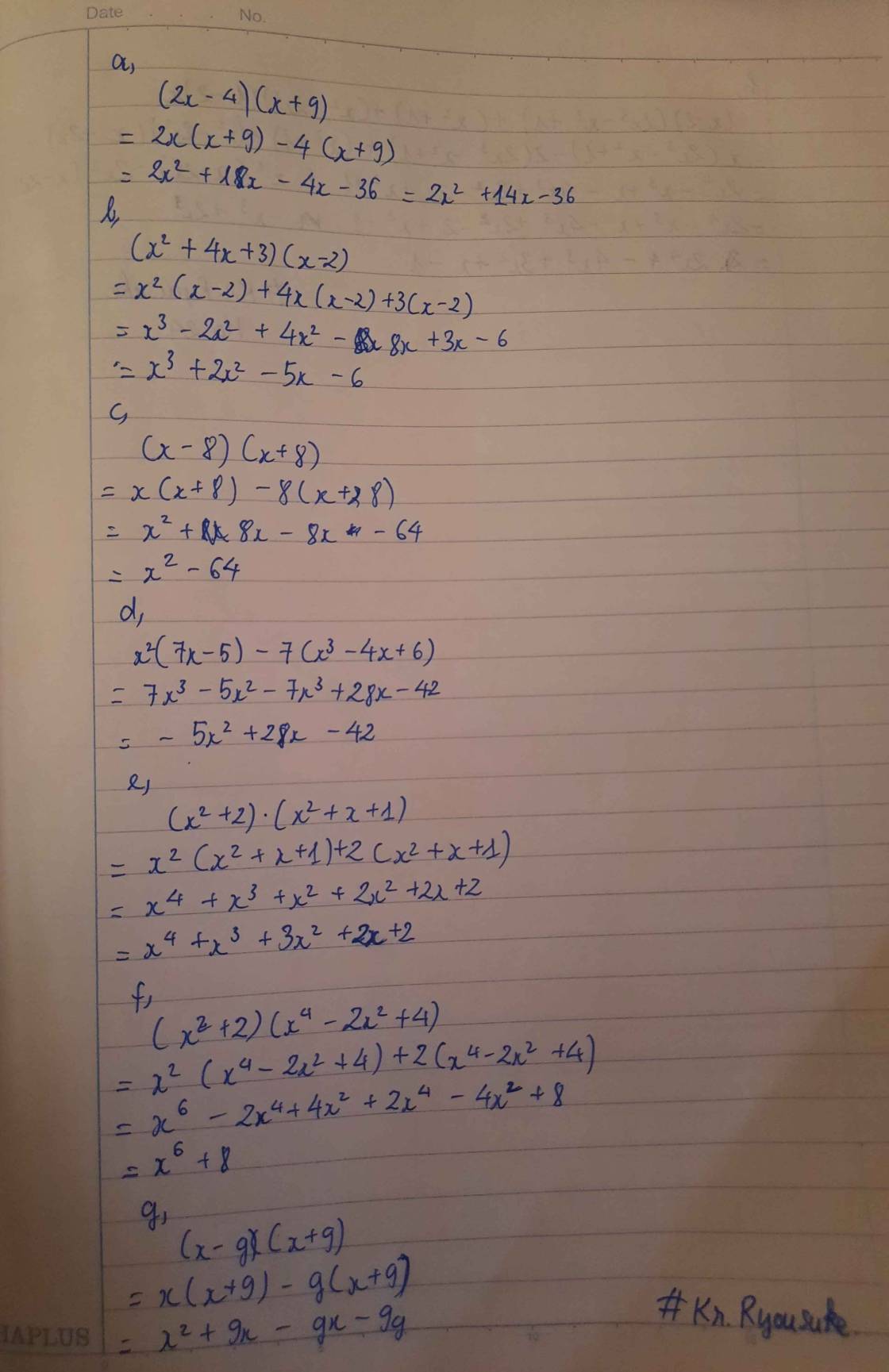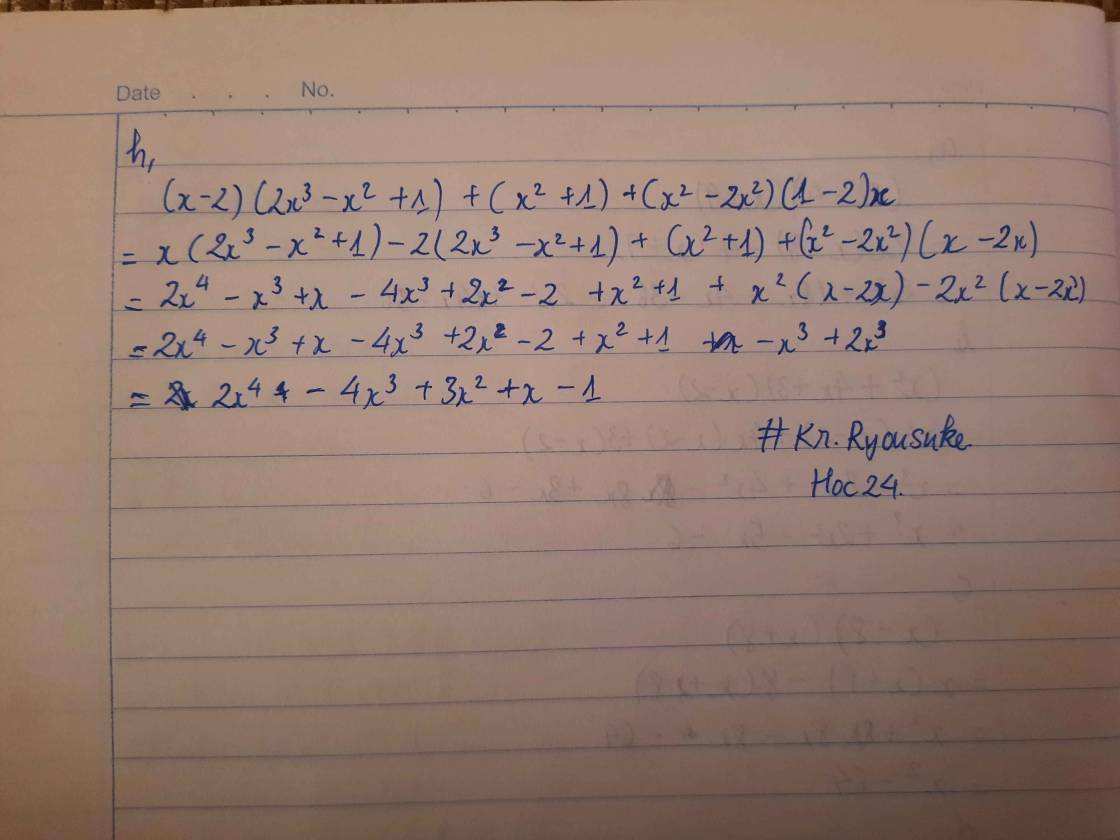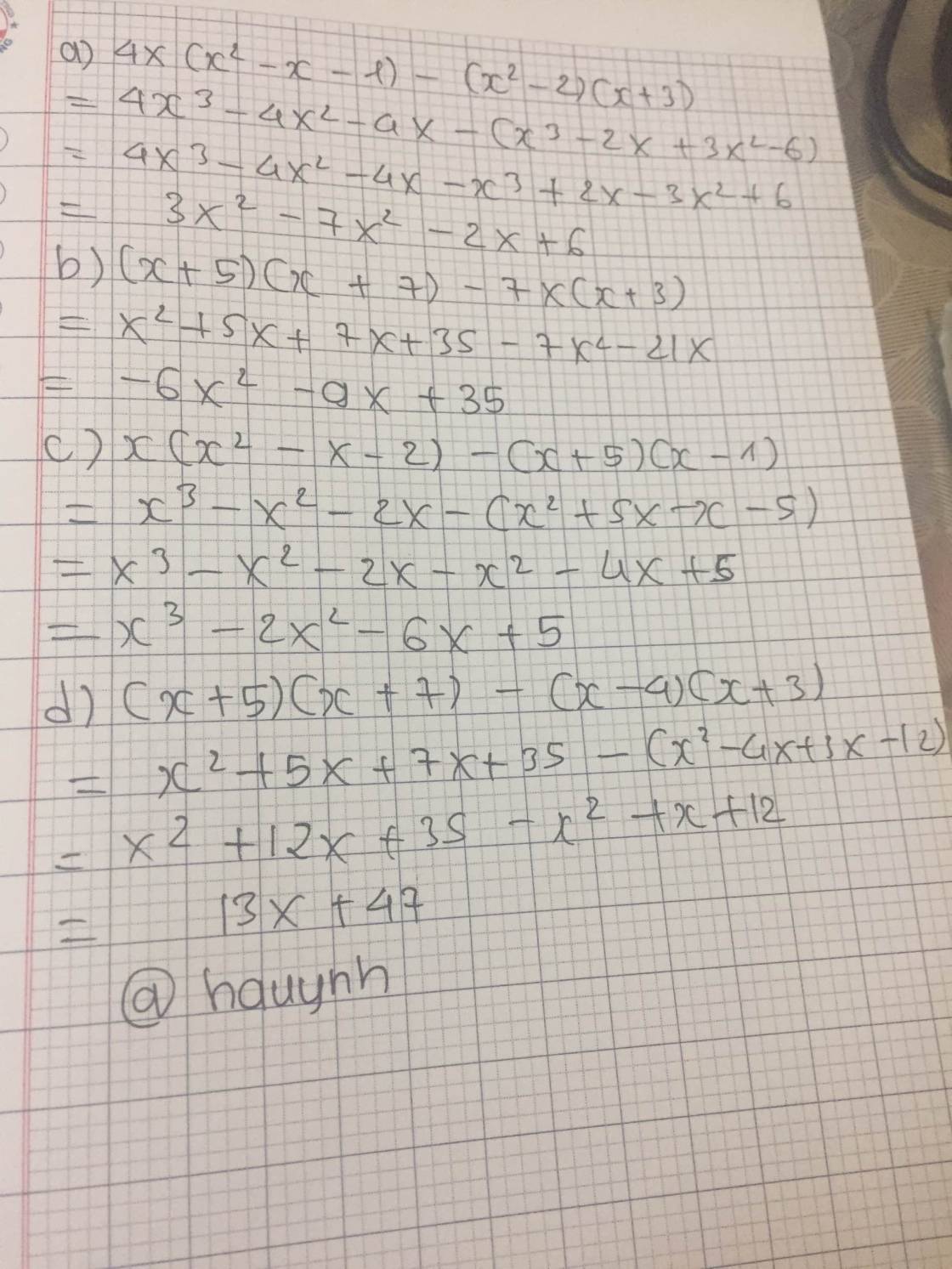Hãy nhập câu hỏi của bạn vào đây, nếu là tài khoản VIP, bạn sẽ được ưu tiên trả lời.

A = - 3\(x\).(\(x-5\)) + 3(\(x^2\) - 4\(x\)) - 3\(x\) - 10
A = - 3\(x^2\) + 15\(x\) + 3\(x^2\) - 12\(x\) - 3\(x\) - 10
A = (- 3\(x^2\) + 3\(x^2\)) + (15\(x\) - 12\(x\) - 3\(x\)) - 10
A = 0 + (3\(x-3x\)) - 10
A = 0 - 10
A = - 10

Lời giải:
1.
$4x+9=0$
$4x=-9$
$x=\frac{-9}{4}$
2.
$-5x+6=0$
$-5x=-6$
$x=\frac{6}{5}$
3.
$x^2-1=0$
$x^2=1=1^2=(-1)^2$
$x=\pm 1$
4.
$x^2-9=0$
$x^2=9=3^2=(-3)^2$
$x=\pm 3$
5.
$x^2-x=0$
$x(x-1)=0$
$x=0$ hoặc $x-1=0$
$x=0$ hoặc $x=1$
6.
$x^2-2x=0$
$x(x-2)=0$
$x=0$ hoặc $x-2=0$
$x=0$ hoặc $x=2$
7.
$x^2-3x=0$
$x(x-3)=0$
$x=0$ hoặc $x-3=0$
$x=0$ hoặc $x=3$
8.
$3x^2-4x=0$
$x(3x-4)=0$
$x=0$ hoặc $3x-4=0$
$x=0$ hoặc $x=\frac{4}{3}$

Dễ
Thế
Mà
Cũnhoir
Dc
Ạ
Chịu
Chắc
Phải
Ngu
Lamqs
Mới
Hỏi
Câu
Này

`@` `\text {dnammv}`
`a,`
`4x(x^2-x-1)-(x^2-2)(x+3)`
`= 4x^3-4x^2-4x- [x^2(x+3)-2(x+3)]`
`= 4x^3-4x^2-4x- (x^3+3x^2-2x-6)`
`= 4x^3-4x^2-4x-x^3-3x^2+2x+6`
`= 3x^3 - 7x^2-2x+6`
`b,`
`(x+5)(x+7)-7x(x+3)`
`= x(x+7)+5(x+7)-7x^2-21x`
`= x^2+7+5x+35-7x^2-21x`
`= -6x^2-16x+35`
`c,`
`x(x^2-x-2)-(x+5)(x-1)`
`= x^3-x^2-2x- [x(x-1)+5(x-1)]`
`= x^3-x^2-2x- (x^2-x+5x-5)`
`= x^3-x^2-2x - x^2 + x -5x+5`
`= x^3-2x^2- 4x+5`
`d,`
`(x+5)(x+7)-(x-4)(x+3)`
`= x(x+7)+5(x+7)- [x(x+3)-4(x+3)]`
`= x^2+7x+5x+35 - (x^2+3x-4x-12)`
`= x^2+12x+35 - x^2+x+12`
`= 13x+47`

a) 6x(5x + 3) + 3x(1 – 10x) = 7
⇒ 30x2+18x+3x-30x2=7
⇒21x=7
⇒x=\(\dfrac{7}{21}\)
⇒x= \(\dfrac{1}{3}\)
b) (3x – 3)(5 – 21x) + (7x + 4)(9x – 5) = 44
⇒15x-63x2-15+63x + 63x2-35x+36x-20=44
⇒79x-35=44
⇒79x=44+35
⇒79x=79
⇒x=1

a) \(4x+9=0\Leftrightarrow4x=-9\Leftrightarrow x=-\dfrac{9}{4}\)
b) \(-5x+6=0\Leftrightarrow5x=6\Leftrightarrow x=\dfrac{6}{5}\)
c) \(x^2-1=0\Leftrightarrow\left(x-1\right)\left(x+1\right)=0\Leftrightarrow\)\(\left[{}\begin{matrix}x=1\\x=-1\end{matrix}\right.\)
d) \(x^2-9=0\Leftrightarrow\left(x-3\right)\left(x+3\right)=0\)\(\Leftrightarrow\left[{}\begin{matrix}x=3\\x=-3\end{matrix}\right.\)
e) \(x^2-x=0\Leftrightarrow x\left(x-1\right)=0\Leftrightarrow\)\(\left[{}\begin{matrix}x=0\\x=1\end{matrix}\right.\)
f) \(x^2-2x=0\Leftrightarrow x\left(x-2\right)=0\Leftrightarrow\)\(\left[{}\begin{matrix}x=0\\x=2\end{matrix}\right.\)
g) \(\left(x-4\right)\left(x^2+1\right)=0\Leftrightarrow x-4=0\Leftrightarrow x=4\)( do \(x^2+1\ge1>0\))
h) \(3x^2-4x=0\Leftrightarrow x\left(3x-4\right)=0\Leftrightarrow\)\(\Leftrightarrow\left[{}\begin{matrix}x=0\\x=\dfrac{4}{3}\end{matrix}\right.\)
i) \(x^2+9=0\Leftrightarrow x^2=-9\)( vô lý do \(x^2\ge0>-9\))
Vậy \(x\in\left\{\varnothing\right\}\)

cho B(x) = 0
\(=>-5x+30=0\Rightarrow-5x=-30\Rightarrow x=6\)
cho E(x) = 0
\(=>x^2-81=0\Rightarrow x^2=81=>\left[{}\begin{matrix}x=9\\x=-9\end{matrix}\right.\)
cho C(x) = 0
\(=>2x+\dfrac{1}{3}=0=>2x=-\dfrac{1}{3}=>x=-\dfrac{1}{6}\)
bạn tham khảo hai câu này nha vì mình ko biết là mấy câu còn lại
B(x)=-5x+30
cho B(x)=0
=> -5x+30=0
-5x=-30
x=-30:(-5)
x=-6
* Vậy nghiệm của đa thức B(x) là -6.
C(x)=2x+1/3
cho C(x)=0
=>2x+1/3=0
2x=-1/3
x=-1/3:2
x=-1/6
vậy nghiệm của đa thức C(x) là -1/6.



\(a,\left(4x+1\right)\left(x-3\right)-\left(x-7\right)\left(4x-1\right)=15\\ \Leftrightarrow4x^2+x-12x-3-\left(4x^2-28x-x+7\right)-15=0\\ \Leftrightarrow4x^2-11x-3-4x^2+29x-7-15=0\\ \Leftrightarrow18x=25\\ \Leftrightarrow x=\dfrac{25}{18}\)
Vậy \(x=\dfrac{25}{18}\)
\(b,\left(x+1\right)\left(x^2-x+1\right)-x\left(x^2-3\right)=4\\ \Leftrightarrow x^3+1-x^3+3x-4=0\\ \Leftrightarrow3x-3=0\\ \Leftrightarrow x=1\)
Vậy \(x=1\)
\(c,\left(x-3\right)\left(x^2+3x+9\right)+x\left(5-x^2\right)-6x=0\\ \Leftrightarrow x^3-27+5x-x^3-6x=0\\ \Leftrightarrow-x-27=0\\ \Leftrightarrow x=-27\)
Vậy \(x=-27\)
\(d,\left(5x-1\right)\left(5x+1\right)=25x^2-7x+15\\ \Leftrightarrow25x^2-1-25x^2+7x-15=0\\ \Leftrightarrow7x-16=0\\ \Leftrightarrow x=\dfrac{16}{7}\)
Vậy \(x=\dfrac{16}{7}\)